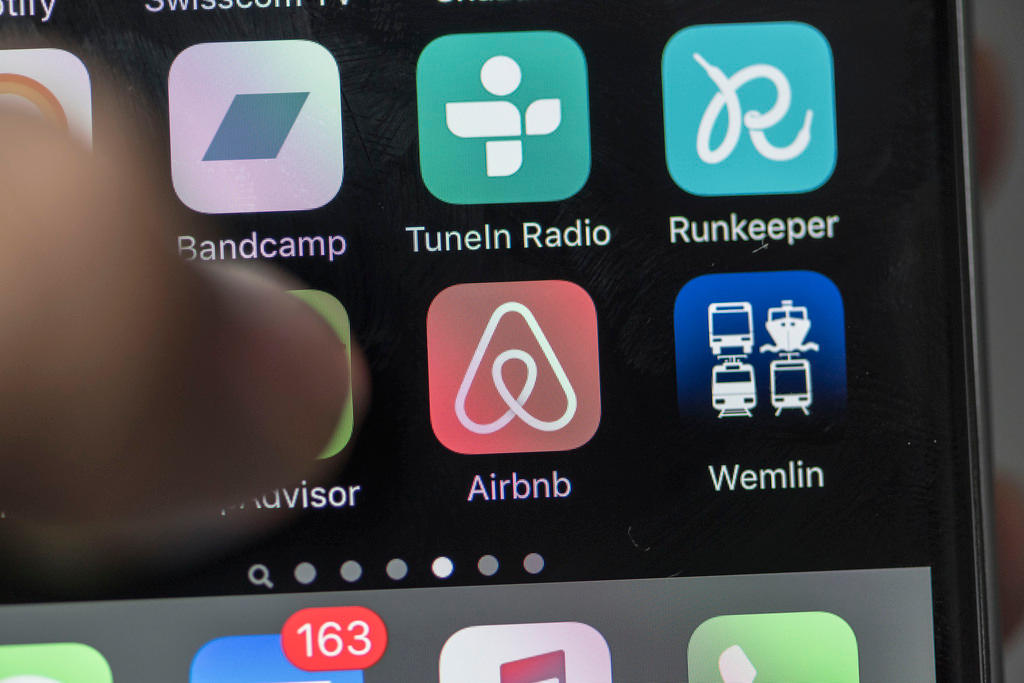Why Switzerland should welcome Airbnb

Airbnb could have the answer to the woes besetting the Swiss tourist industry – that is, if anyone is willing to listen instead of seeing the booking platform as unfair competition.
In February, an announcement that is still generating headlines was made in the news stating that the number of people checking into Swiss hotels dropped last year.
Although the decrease wasn’t huge – only 0.8% – the industry is very concerned that there were 9% fewer visitors from the neighbouring countries Switzerland has traditionally counted on.
In fact, one has to go back to 1958 to find the last time there were so few Europeans booked into Swiss hotels.
The drop has reignited calls for something to be done to make Switzerland more affordable. Ever since January 2015, when the Swiss National Bank ended its long-standing cap that kept in check franc-strength versus the euro, Europeans have lost significant purchasing power when travelling in Switzerland.

But numbers can be misleading, and the bad news may not be all that bad for the domestic tourist industry. Almost every night less spent in Swiss hotels by Germans, French, Italians and Belgians last year was made up by additional nights booked into Airbnb-registered accommodation (see how the numbers compare in the box below).
Instead of seeing this shift as positive – a sign that Europeans (two-thirds of Swiss Airbnb guests are European) are still interested in visiting Swiss cities and seeing its mountains! – the American booking platform is considered a rogue newcomer, muscling in on the hotels’ turf, and refusing to play by the rules.
There is no question that the authorities must step in to prevent abuse of the system by people like the man in Geneva accused of offering 100 flats for short-term rental on Airbnb, and in so doing, removing affordable housing from what is already a very tight property market. Berlin has implemented a ban on people renting out whole apartments to short-term visitors for this reason. The same goes for the tourist tax levied in Switzerland. The hosts – whether hotels, campgrounds, or bed and breakfasts, and not the booking platforms they use – are legally obliged to pay the fee (usually CHF3-4 per night per guest) to their local council. Airbnb hosts not doing so must face fines.
Airbnb should be accepted for what it is: an online platform that has simplified the entire travel business. In the case of the traveller, the convenience is in the finding, booking and paying for accommodation; for the host, it’s the ease with which it can market a room or flat, and collect payment.
Complementary niches
If the main complaint of hotel and tourism directors is that Switzerland can’t compete on price with other countries, then the growth of Airbnb may be proving them wrong.
A quick check of offers in Zurich on two of the most popular online reservation sites – Airbnb and booking.comExternal link – called up several centrally located places on Airbnb for under CHF100 ($101) whereas booking.com failed to find any hotels under CHF150, with most of the lower-price places charging around CHF200.
Today’s reality is a global travel industry that has been in transition for some time. Europeans interested in a long weekend abroad that doesn’t break the bank have a smorgasbord of low-cost flights. It only follows that they’ll also search the web for an affordable place to stay. Just looking at these two main cost factors, Switzerland doesn’t compare badly with its neighbours.
True, these travellers aren’t leaving much money behind in hotels, but their contributions to the local tourist economy shouldn’t be underestimated: they are eating in restaurants, shopping, and buying train passes. The cash they may have paid for hotels they are instead handing over for once-in-a-lifetime experiences that Switzerland and few other countries can provide – whether it’s tasting the sweet delights made in a chocolate factory, or paragliding off a mountaintop.
Without a doubt, competition is increasing for the hotel industry, but it will survive. Demand for business hotels will continue to mirror the state of the economy, and there will always be people willing to pay for the privilege of staying in holiday accommodation combining great location, friendly staff and a selection of comforts and pampering – onsite dining, indoor pools, gyms and room service – that only a hotel can provide.
Switzerland’s tourist industry is the sum of its parts, and the hotel sector is just one of these parts. In an article in the newspaper Aargauer Zeitung on May 21, the director of the regional tourist office said she saw the American platform as “complementary” to hotels since “every available room meeting the minimum quality standards is important” for tourism.
Hotels can also learn a lesson from the Airbnb model, which the Airbnb founders learned from social media: that the experience of engaging online with real people can be monetised. When was the last time you got to talk to the hotel director and saw his or her personal profile when booking a room?
In mid-May, Airbnb announced that the number of people booking accommodation in Switzerland on its platform doubled to 300,000 last year compared to 2014. They stayed on average 4.5 nights. This added up to 1.35 million in total, or almost 700,000 more than the year before.
In comparison, Swiss hotels saw a year-on-year decrease of 858,000 nights spent by German, French, Italian and Belgian tourists.
Follow the author on Twitter @dalebechtel

In compliance with the JTI standards
More: SWI swissinfo.ch certified by the Journalism Trust Initiative






You can find an overview of ongoing debates with our journalists here. Please join us!
If you want to start a conversation about a topic raised in this article or want to report factual errors, email us at english@swissinfo.ch.